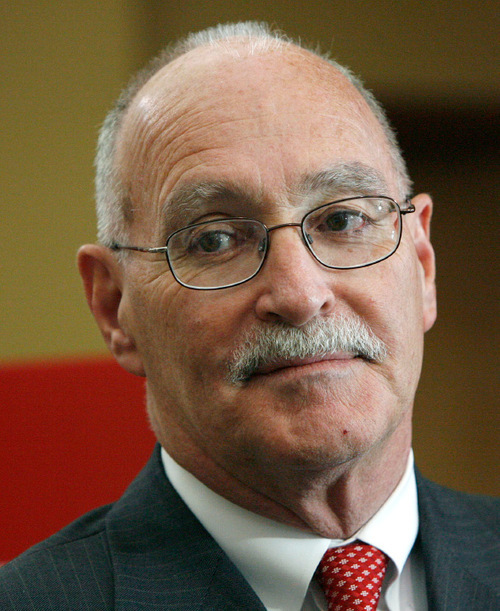This is an archived article that was published on sltrib.com in 2010, and information in the article may be outdated. It is provided only for personal research purposes and may not be reprinted.
In his 18 months as Utah Republican Party chairman, Dave Hansen witnessed an unprecedented surge from the tea party movement, the ouster of one of his party's senior figures and a failed bid by Salt Lake City to host the party's national convention.
Now, as Hansen announces his resignation on Saturday, he said he is proud of the work the state party has done and points to the Republican victories in last month's election — except for his white whale, Democratic Rep. Jim Matheson — as a sign of his success.
"The party exists primarily for one reason and that is to help Republican candidates get elected, and we were quite successful," Hansen said in an interview Friday. "We weren't totally successful. It would have been nice to have won [Matheson's] 2nd Congressional seat … that would have been perfect if we could have done that."
But Hansen, who will announce his resignation as party chairman at the party's central committee meeting, said the GOP is poised to remain the state's dominant political party, with strong county organizations and enthusiastic tea party support.
Hansen will formally leave the post in January — five months before his term is scheduled to expire — to return to the payroll of Sen. Orrin Hatch's re-election campaign, an operation he managed in 2004. The same tea party vigor that brought down U.S. Sen. Bob Bennett now poses perhaps the greatest threat of Hatch's six terms.
"It's certainly not going to be a cakewalk and [the senator] knows that. We all know that," Hansen said. "But he's been a good U.S. senator and there's ample reasons to have him continue."
Utah's Republican National Committeewoman Enid Mickelsen, who preceded Hansen as state party chair, said there could have been turmoil if Hansen had not been able to bleed the tea party participants, many of whom had never been politically active, into the Republican ranks.
"This was a particularly turbulent year," she said. "There was a potential there for a real clash and Dave made sure that didn't happen."
David Kirkham, one of the original organizers of Utah's tea party, said Hansen never did anything to obstruct the group and was always accommodating, and not just because of political calculations about the group's potential power.
"He helped from the very beginning when nobody knew about the tea party," Kirkham said. "I have nothing but the highest regard for Dave Hansen."
Thomas Wright, chairman of the Salt Lake County Republican Party, said Hansen was supportive of the county parties' efforts without trying to muscle in and get credit, and at the end of the day, that paid dividends.
"It's been a real pleasure to work with somebody who cared more about doing what he could to help rather than somebody trying to take control and get credit," Wright said.
Wright so far is the only candidate who has declared he will run for Hansen's spot.
Earlier this year, Hansen, Mickelsen and Utah Republican National Committeeman Bruce Hough were key players as Salt Lake City became a finalist to host the 2012 Republican National Convention. Salt Lake City lost out to Tampa, Fla., because, Mickelsen said, the city was unable to muster the financial commitments the national party was looking for.
Hansen's ties to Hatch drew scrutiny earlier this year when The Tribune reported that Hansen had been receiving $5,000 a month from Hatch's campaign, even though he had said he would stop being paid by the senator when he was elected state party chairman a year earlier.
Hansen called the money a bonus for previous work, but other Republicans called the payments inappropriate.
Those payments, and the Republican Party's opposition to a statewide ethics initiative, show Hansen has a blind spot on ethics issues, said Todd Taylor, the executive director of the Utah Democratic Party.
"That said, he's the consummate political professional and I'm sorry to see him go," Taylor said. "In some ways it's good news for us, because there's no chance of someone as qualified taking his place because there is literally no one else in his class."
Hansen leaves a party that is essentially broke, having exhausted its resources in the November election, although Hansen said that should come as no surprise, since the party should always do everything it can to get its candidates elected.
He said one of the areas where he thinks he may have fallen short is in developing the party's small-donor base, raising lots of smaller contributions rather than relying on big donations.
Hansen said he doesn't plan to endorse a replacement when the central committee selects the next chairman in January.
"Dave's done a great job as chairman," Wright said. "He's done a lot of positive things and the state of the party is healthy and is staged perfectly to do even bigger and better things than it's done in the past." —
Dave Hansen's background
R Dave Hansen is a longtime political operative. He has served as political director of the National Republican Senatorial Committee and was the regional field representative for the Republican National Committee. He has run Fred Lampropoulos' gubernatorial campaign, John Swallow's congressional bid and Hatch's Senate run. He has served as executive director of the Utah and Montana state parties and was deputy lieutenant governor under Gov. Norm Bangerter.



